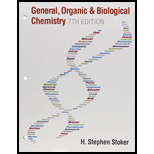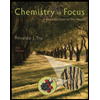
Bundle: General, Organic, and Biological Chemistry, 7th + OWLv2 Quick Prep for General Chemistry, 4 terms (24 months) Printed Access Card
7th Edition
ISBN: 9781305717534
Author: H. Stephen Stoker
Publisher: Cengage Learning
expand_more
expand_more
format_list_bulleted
Concept explainers
Textbook Question
Chapter 23, Problem 23.59EP
List, by name, the four general stages of the process by which biochemical energy is obtained from food.
Expert Solution & Answer
Want to see the full answer?
Check out a sample textbook solution
Students have asked these similar questions
If a chocolate cake has 24g of carbohydrates, 11g of fat, and 10.5g of protein, which class of organic material contributes the most amounts of calories to the chocolate cake?
The label on a can of ”Healthy Request” chicken noodle soup indicates that each 1-cup portion supplies 145 kcal and has 9 g of protein, 16 g of carbohydrate, and 5 g of fat.
Calculate the percentage of calories that come from protein, carbohydrates, and fat.
Use the following information corresponding to 1 Molar concentrations of reactants and products for Questions 7 -13.
ΔHo’ = -63.39 kJ/mol and ΔS o’ = -0.1255 kJ/molK.
Glycerol + ATP → ADP + 3-Phosphoglycerate:
ΔHo’ = -63.39 kJ/mol and ΔS o’ = -0.1255 kJ/molK.
At what temperature (if any) is this reaction excergonic?
Report your answer in Kelvin using inequality signs with out and extra spaces added in.
For example
T=100.00K
T>100.00K
T<100.00K
T</=100.00K less than or equal to
T>/=100.00K greater than or equal to
Chapter 23 Solutions
Bundle: General, Organic, and Biological Chemistry, 7th + OWLv2 Quick Prep for General Chemistry, 4 terms (24 months) Printed Access Card
Ch. 23.1 - Prob. 1QQCh. 23.1 - Prob. 2QQCh. 23.2 - Which of the following is not found within the...Ch. 23.2 - Which of the following is not an organelle? a....Ch. 23.2 - Prob. 3QQCh. 23.2 - Prob. 4QQCh. 23.3 - Which of the following statements concerning...Ch. 23.3 - Prob. 2QQCh. 23.3 - Which of the following statements concerning...Ch. 23.3 - Which of the following statements concerning...
Ch. 23.3 - Which of the following statements concerning...Ch. 23.4 - Prob. 1QQCh. 23.4 - Prob. 2QQCh. 23.5 - Prob. 1QQCh. 23.5 - Prob. 2QQCh. 23.5 - Prob. 3QQCh. 23.6 - Which of the following occurs in the second stage...Ch. 23.6 - Which of the following stages in the biochemical...Ch. 23.6 - Prob. 3QQCh. 23.7 - Prob. 1QQCh. 23.7 - Prob. 2QQCh. 23.7 - Prob. 3QQCh. 23.7 - How many NADH and FADH2 molecules are produced,...Ch. 23.7 - Which of the following citric acid cycle...Ch. 23.7 - In which of the following listings of citric acid...Ch. 23.8 - Which of the following is a fuel for the electron...Ch. 23.8 - Prob. 2QQCh. 23.8 - What is the substrate that initially interacts...Ch. 23.8 - The number of fixed enzyme sites in the electron...Ch. 23.8 - In which of the following listings of electron...Ch. 23.8 - Prob. 6QQCh. 23.9 - How many of the four enzyme complexes in the...Ch. 23.9 - Prob. 2QQCh. 23.9 - Prob. 3QQCh. 23.10 - Prob. 1QQCh. 23.10 - Prob. 2QQCh. 23.11 - Prob. 1QQCh. 23.11 - Prob. 2QQCh. 23.11 - Prob. 3QQCh. 23.12 - Prob. 1QQCh. 23.12 - Prob. 2QQCh. 23 - Classify anabolism and catabolism as synthetic or...Ch. 23 - Classify anabolism and catabolism as...Ch. 23 - What is a metabolic pathway?Ch. 23 - Prob. 23.4EPCh. 23 - Classify each of the following processes as...Ch. 23 - Classify each of the following processes as...Ch. 23 - Prob. 23.7EPCh. 23 - Prob. 23.8EPCh. 23 - Prob. 23.9EPCh. 23 - Indicate whether each of the following statements...Ch. 23 - Prob. 23.11EPCh. 23 - Prob. 23.12EPCh. 23 - Prob. 23.13EPCh. 23 - Prob. 23.14EPCh. 23 - Specify, by name and by number present, the...Ch. 23 - Prob. 23.16EPCh. 23 - Prob. 23.17EPCh. 23 - Prob. 23.18EPCh. 23 - Prob. 23.19EPCh. 23 - Prob. 23.20EPCh. 23 - Prob. 23.21EPCh. 23 - Prob. 23.22EPCh. 23 - Write a generalized chemical equation, containing...Ch. 23 - Prob. 23.24EPCh. 23 - Prob. 23.25EPCh. 23 - Prob. 23.26EPCh. 23 - Draw each of the following types of block diagrams...Ch. 23 - Prob. 23.28EPCh. 23 - What is the name of the B vitamin present in each...Ch. 23 - Prob. 23.30EPCh. 23 - Prob. 23.31EPCh. 23 - Prob. 23.32EPCh. 23 - Prob. 23.33EPCh. 23 - Prob. 23.34EPCh. 23 - Prob. 23.35EPCh. 23 - Prob. 23.36EPCh. 23 - Prob. 23.37EPCh. 23 - Prob. 23.38EPCh. 23 - Prob. 23.39EPCh. 23 - Prob. 23.40EPCh. 23 - Prob. 23.41EPCh. 23 - Prob. 23.42EPCh. 23 - Prob. 23.43EPCh. 23 - Prob. 23.44EPCh. 23 - Prob. 23.45EPCh. 23 - Prob. 23.46EPCh. 23 - Prob. 23.47EPCh. 23 - Prob. 23.48EPCh. 23 - Prob. 23.49EPCh. 23 - Prob. 23.50EPCh. 23 - Prob. 23.51EPCh. 23 - Prob. 23.52EPCh. 23 - Prob. 23.53EPCh. 23 - Prob. 23.54EPCh. 23 - Prob. 23.55EPCh. 23 - Prob. 23.56EPCh. 23 - Prob. 23.57EPCh. 23 - Prob. 23.58EPCh. 23 - List, by name, the four general stages of the...Ch. 23 - Prob. 23.60EPCh. 23 - Prob. 23.61EPCh. 23 - Prob. 23.62EPCh. 23 - Prob. 23.63EPCh. 23 - Prob. 23.64EPCh. 23 - Prob. 23.65EPCh. 23 - Prob. 23.66EPCh. 23 - Prob. 23.67EPCh. 23 - Prob. 23.68EPCh. 23 - Prob. 23.69EPCh. 23 - Prob. 23.70EPCh. 23 - Prob. 23.71EPCh. 23 - Prob. 23.72EPCh. 23 - Prob. 23.73EPCh. 23 - Prob. 23.74EPCh. 23 - Prob. 23.75EPCh. 23 - Prob. 23.76EPCh. 23 - Prob. 23.77EPCh. 23 - Prob. 23.78EPCh. 23 - Prob. 23.79EPCh. 23 - Prob. 23.80EPCh. 23 - Prob. 23.81EPCh. 23 - Prob. 23.82EPCh. 23 - Prob. 23.83EPCh. 23 - Prob. 23.84EPCh. 23 - Prob. 23.85EPCh. 23 - Prob. 23.86EPCh. 23 - Prob. 23.87EPCh. 23 - Prob. 23.88EPCh. 23 - Indicate whether each of the following changes...Ch. 23 - Prob. 23.90EPCh. 23 - Prob. 23.91EPCh. 23 - Prob. 23.92EPCh. 23 - Which electron carrier shuttles electrons between...Ch. 23 - Prob. 23.94EPCh. 23 - Prob. 23.95EPCh. 23 - Prob. 23.96EPCh. 23 - Prob. 23.97EPCh. 23 - Prob. 23.98EPCh. 23 - Prob. 23.99EPCh. 23 - Prob. 23.100EPCh. 23 - Put the following substances in the correct order...Ch. 23 - Prob. 23.102EPCh. 23 - Prob. 23.103EPCh. 23 - Prob. 23.104EPCh. 23 - Prob. 23.105EPCh. 23 - Prob. 23.106EPCh. 23 - Prob. 23.107EPCh. 23 - Prob. 23.108EPCh. 23 - Prob. 23.109EPCh. 23 - Prob. 23.110EPCh. 23 - How many protons cross the inner mitochondrial...Ch. 23 - How many protons cross the inner mitochondrial...Ch. 23 - Prob. 23.113EPCh. 23 - Prob. 23.114EPCh. 23 - Prob. 23.115EPCh. 23 - Prob. 23.116EPCh. 23 - Prob. 23.117EPCh. 23 - Prob. 23.118EPCh. 23 - Prob. 23.119EPCh. 23 - Prob. 23.120EPCh. 23 - Prob. 23.121EPCh. 23 - Prob. 23.122EPCh. 23 - Prob. 23.123EPCh. 23 - Prob. 23.124EPCh. 23 - Prob. 23.125EPCh. 23 - Prob. 23.126EPCh. 23 - Prob. 23.127EPCh. 23 - Prob. 23.128EPCh. 23 - Indicate whether or not each of the following B...Ch. 23 - Prob. 23.130EPCh. 23 - Prob. 23.131EPCh. 23 - Prob. 23.132EP
Knowledge Booster
Learn more about
Need a deep-dive on the concept behind this application? Look no further. Learn more about this topic, chemistry and related others by exploring similar questions and additional content below.Similar questions
- If you begin an exercise program and burn 5 Calories per minute by walking, how many hours of walking per day would you have to do in two weeks to lose 7 pounds? You must burn an extra 3500 Calories to lose 1 pound of body weight.arrow_forwardA student is investigating the process of cellular respiration and relates the energy changes involved in the process. C6H1206 + 602 6H20 + 6CO2 + energy Based on the cellular respiration equation, which of the following will be the correct ? O Endothermic graph because energy is absorbed. O Exothermic graph because energy is absorbed. O Exothermic graph because energy is released. O Endothernic graph because energy is released.arrow_forwardPlease explain and show the steps to how you got this!arrow_forward
- Calculate the number of calories in a 5 fluid ounce glass of red wine that contains 2.6 g of carbohydrates and 12.9 g of alcohol.arrow_forward4. A particular food contains only fat, carbohydrates and protein and has a total of 388 Calories.If 40% of the total Calories comes carbohydrates and 25% of the total Calories comes fromprotein, how many grams of a) carbohydrates b) protein and c) fat are present in this food iteM?arrow_forwardFor what is the energy released during metabolism in humans used?arrow_forward
- Mrs. Belew's favorite Chic-Fil-A meal is the Spicy Southwest Salad. It contains 19 g fat, 36 g carbs, and 34 g protein. How many calories are in this meal?arrow_forwardRiding a bicycle at 12–13 miles per hour uses 563 Calories in an hour. Convert this value to (a) calories; (b) kilocalories; (c) joules; (d) kilojoules.arrow_forwardIf you begin an excersize program and burn 5 calories per minute by walking, how many hours of walking per day would you have to do in two weeks to lose 3 pounds? You must burn an extra 3500 calories to lose 1 pound of body weight.arrow_forward
- How many Calories are found in a frozen pizza that has 17 g of fat, 38 g of carbohydrates, and 13 g of protein?arrow_forwardOne gram of alcohol provides 7 Calories. Calculate the number of Calories in a 5 fluid ozoz glass of red wine that contains 3.0 gg carbohydrate and 12.1 gg alcohol.arrow_forwardClassify the following compounds as endergonic or exergonic : (a) glucose,(b) methylamine, (c) octane, (d) ethanol.arrow_forward
arrow_back_ios
SEE MORE QUESTIONS
arrow_forward_ios
Recommended textbooks for you
 General, Organic, and Biological ChemistryChemistryISBN:9781285853918Author:H. Stephen StokerPublisher:Cengage Learning
General, Organic, and Biological ChemistryChemistryISBN:9781285853918Author:H. Stephen StokerPublisher:Cengage Learning Organic And Biological ChemistryChemistryISBN:9781305081079Author:STOKER, H. Stephen (howard Stephen)Publisher:Cengage Learning,
Organic And Biological ChemistryChemistryISBN:9781305081079Author:STOKER, H. Stephen (howard Stephen)Publisher:Cengage Learning, Chemistry for Today: General, Organic, and Bioche...ChemistryISBN:9781305960060Author:Spencer L. Seager, Michael R. Slabaugh, Maren S. HansenPublisher:Cengage Learning
Chemistry for Today: General, Organic, and Bioche...ChemistryISBN:9781305960060Author:Spencer L. Seager, Michael R. Slabaugh, Maren S. HansenPublisher:Cengage Learning Chemistry In FocusChemistryISBN:9781305084476Author:Tro, Nivaldo J., Neu, Don.Publisher:Cengage Learning
Chemistry In FocusChemistryISBN:9781305084476Author:Tro, Nivaldo J., Neu, Don.Publisher:Cengage Learning Chemistry: The Molecular ScienceChemistryISBN:9781285199047Author:John W. Moore, Conrad L. StanitskiPublisher:Cengage Learning
Chemistry: The Molecular ScienceChemistryISBN:9781285199047Author:John W. Moore, Conrad L. StanitskiPublisher:Cengage Learning

General, Organic, and Biological Chemistry
Chemistry
ISBN:9781285853918
Author:H. Stephen Stoker
Publisher:Cengage Learning

Organic And Biological Chemistry
Chemistry
ISBN:9781305081079
Author:STOKER, H. Stephen (howard Stephen)
Publisher:Cengage Learning,

Chemistry for Today: General, Organic, and Bioche...
Chemistry
ISBN:9781305960060
Author:Spencer L. Seager, Michael R. Slabaugh, Maren S. Hansen
Publisher:Cengage Learning


Chemistry In Focus
Chemistry
ISBN:9781305084476
Author:Tro, Nivaldo J., Neu, Don.
Publisher:Cengage Learning

Chemistry: The Molecular Science
Chemistry
ISBN:9781285199047
Author:John W. Moore, Conrad L. Stanitski
Publisher:Cengage Learning
DIGESTER-35 | VITAMINS AND THEIR RELATED COENZYMES| GPAT | NIPER | PHARMACIST| DI; Author: GPAT DISCUSSION CENTER;https://www.youtube.com/watch?v=CGrdNYmho0s;License: Standard YouTube License, CC-BY